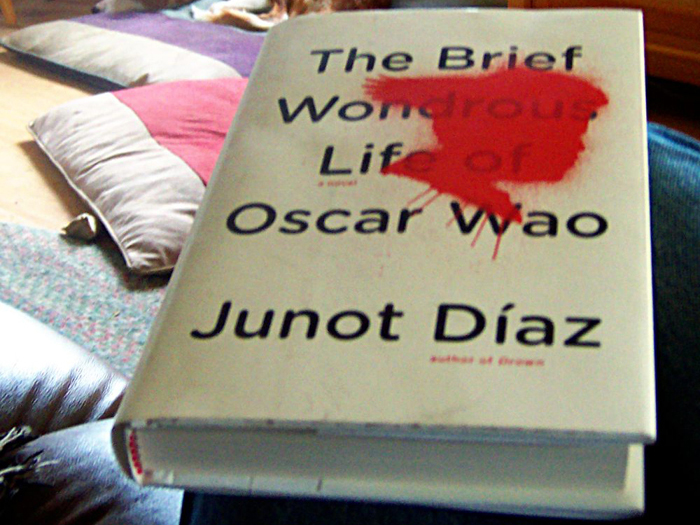If you missed the arrival of Junot Diaz on the scene with his collection of short stories Drown, I can forgive you. The Brief Wondrous Life of Oscar Wao had been sitting on the top of a large pile of books-to-read for longer than I care to admit. But if you missed Junot Diaz’s reading and book signing this Wednesday, well then we just cannot be friends.
I understand not everyone sees Pulitzer Prize-winning authors as celebrities, or gushes over them while wearing their lucky hat, or almost spits out that they would like to give birth to their children. Maybe that’s just me. But Junot Diaz has something for everyone.
Being in front of a teeming crowd of people seemed effortless to him, and he immediately put the crowd at ease with his informalities, humility, and intimacy.
He does not seem at all affected by his fame, which he admitted is probably from growing up in a disciplinarian, military family where “celebration was for moronic civilians.”
In other words, he’s for real – laid back but not passive, funny but not fluffy, lively, and extremely intelligent (I mean, he is the Nancy Allen professor at MIT).
Diaz’s reading was slow and deliberate – every word had meaning. Like in his writing, he speaks with an easy flow between español and inglés. Yet he seemed much more interested in the Q & A then in hearing himself read.
Diaz often responded with surprising and moving thoughts on the act of writing – how he lived with these characters for eleven years, building this novel up like a cathedral, yet how “when you’re done you have to let these characters go, and you think, ‘farewell!’” He built the Dominican family in The Brief Wondrous Life of Oscar Wao as a complete entity – they don’t make sense apart as individual characters.
Diaz also discussed the politics of his writing – of the Caribbean and female experience, the trope of the sci-fi hypercharged genre, his use of “n-gger vs. n-gga’,” and his annoyance at what a culture chooses to create uproar about that they don’t understand. According to Diaz, many people say they miss out on so much of his book by not knowing Spanish, but don’t complain about his out-there sci-fi references, virtually unknown to those who didn’t grow up in the Marvel universe.
When responding to the question of whether he wanted to alienate readers with his constant interchange between Spanish, slang, and English – he laughed that his thought process wasn’t, “Ha, now you gringos will suffer!”
Diaz wants his novel to urge its readers to find someone who does understand, and to seek community, as it takes a whole bunch of people to begin to understand any (good) novel. He speaks and writes in multiple voices to challenge the myth of linguistic purity and that anyone should have to “decide a side.”
His hatred of politics (especially in terms of the First/Third World split) is clear, and nothing reveals that more than the “gimmick” of his painfully long footnotes, in the style of David Foster Wallace. The footnotes, with their flawed, arbitrary history, exposes the authority we unquestionably give to a certain kind of narrative, an act which in many ways is not unlike being in a dictatorship (language is too politically charged not to try and repress you). This authority is the same authority we give the misogynistic narrator Yunior, who in reality we probably shouldn’t trust.
On life itself, Diaz is incredibly prolific. “Novels are like life – a good portion is unintelligible, most we don’t even hear.” For Junot Diaz, the novel mimics life and its opacity.
And on love – “If you leave more love in the world than you took out, you lived a wondrous life.”
Junot Diaz seems at the heart of him to understand the nature of life and art, and how to connect them, which I believe is a rare if impossible gift: “We did nothing to earn this life, we got it for free and it’s fleeting.”











I love Junot Diaz, too. Cheers to Conn for getting him out here, he was arresting and warm and inspiring in a totally unaffected way, and that’s admirable.
’12s and ’13s should consider getting him to speak at Commencement. As Susannah says, he’s got no shortage of hard-won life advice to give, and speaks from a genuine voice.